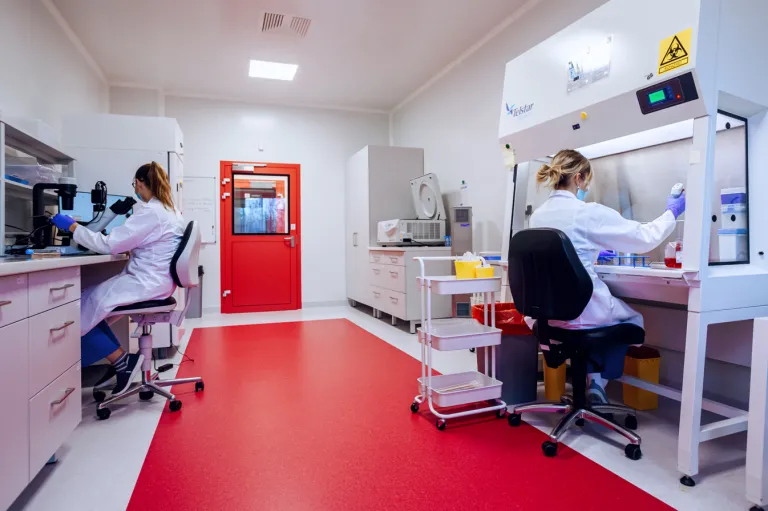Hypothyroidism in pregnancy is faced by about 2% of pregnant women. In some of them, the disease is asymptomatic, so its diagnosis is difficult. Insufficient thyroid hormones that go untreated can result in miscarriage or premature birth. Treatment is based on pharmacotherapy.
Insufficient thyroid hormones during pregnancy can also be one of the causes of pre-eclampsia in the mother-to-be, hypertension and nervous system developmental disorders in the child. Untreated hypothyroidism makes it very difficult to get pregnant.
Hypothyroidism and getting pregnant
In women, hypothyroidism sometimes causes infertility. This is because in the course of the disease, prolactin levels increase, resulting in ovulation-free cycles. This level can be lowered with medication, but the therapy will have no effect if the woman does not take thyroid hormones at the same time. With hypothyroidism, getting pregnant is difficult.
If conception nevertheless occurs, hypothyroidism during pregnancy can interfere with its maintenance. This is because the cause of thyroid hormone deficiency is very often autoimmune thyroiditis combined with hypothyroidism. The woman’s body produces antibodies that cause the embryo to be treated as a foreign body and should be expelled.
Pregnancy and hypothyroidism
If a woman has hypothyroidism during pregnancy, the impact on the baby is enormous. In a toddler the gland does not appear until the 7th week of pregnancy and does not yet produce hormones, which is why the mother’s hormones are so important for the baby. This determines its proper development, because between 10 and 20 weeks of pregnancy the brain of the toddler is formed, and thyroxine, produced by the thyroid gland, is responsible for this. In the case of untreated hypothyroidism in pregnancy, the result is a serious disorder that ends in premature birth and low birth weight of the child, or even mental retardation. With hypothyroidism, pregnancy can be at risk.
If a woman is diagnosed with hypothyroidism, and the pregnancy is developing normally, special attention should be paid to the results of laboratory tests in order to modify the dose of the drug in time.
Hypothyroidism in pregnancy – symptoms
The most difficult form of hypothyroidism to treat is subclinical hypothyroidism in pregnancy. In its course, no symptoms appear, so emphasis is placed on monthly monitoring of hormone levels during pregnancy.
As a matter of fact, the diagnosis is also made more difficult by the pregnancy itself. The symptoms of hypothyroidism in pregnancy are very similar to the ailments that occur as a result of hormonal changes in a woman’s body. It’s hard to get a correct diagnosis then.
Symptoms of hypothyroidism during pregnancy:
- muscle stiffness;
- joint pain;
- Cold fingers and toes;
- hoarse;
- Swelling, especially of the eyelids and neck;
- thyroid goiter;
- Brittleness of hair and nails;
- shallowed breathing;
- constant fatigue;
- sluggishness;
- constipation;
- dry skin;
- large weight gain.
Hypothyroidism detected in pregnancy should be treated as soon as possible. In some situations, the subclinical form of hypothyroidism can remain latent until delivery. Hypothyroidism after pregnancy is also subject to treatment.
Hypothyroidism in pregnancy – treatment
Hypothyroidism in pregnancy is treated with levothyroxine. The hormone is administered in pills, and its dosage depends on the needs of the mother-to-be. During pregnancy, the dosage of the drug changes many times due to the baby’s growth and development, and also as a result of mom’s increasing weight. Levothyroxine is an analog of thyroxine produced by the thyroid gland. It is a drug that is issued on the basis of a doctor’s prescription. The cost of the preparation is an expense of a few zlotys.
The cause of hypothyroidism in pregnancy can also be iodine deficiency. The demand for the element increases during pregnancy and the postpartum period, when a woman is breastfeeding. If your doctor does not recommend taking iodine in higher doses, you can supplement with iodine through the use of vitamin preparations for pregnant women.
A woman with hypothyroidism during pregnancy should be under the constant supervision of a gynecologist and endocrinologist. It is necessary for her to constantly monitor her thyroid hormone levels. Until the 26th week of pregnancy, she should do them once a month. Between 26 and 32 weeks of pregnancy at least once. Treated hypothyroidism in pregnancy is a guarantee that a healthy baby will be born.
See also:
Hashimoto’s and pregnancy
Rate this article:










